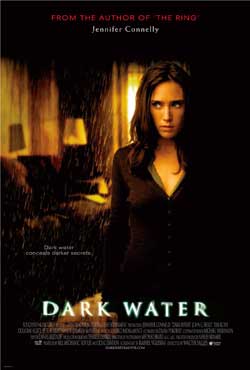 This week sees the latest Japanese horror remake hitting theaters, Dark Water. Not only does the film have a stellar cast that includes Jennifer Connelly, John C Reilly and Tim Roth, it’s directed by Motorcycle Diaries helmer Walter Salles. And the prestige doesn’t stop there – screenweiter Rafael Yglesias has a number of great scripts under his belt, including Fearless (adapted from his own novel) and Roman Polanski’s Death and the Maiden.
This week sees the latest Japanese horror remake hitting theaters, Dark Water. Not only does the film have a stellar cast that includes Jennifer Connelly, John C Reilly and Tim Roth, it’s directed by Motorcycle Diaries helmer Walter Salles. And the prestige doesn’t stop there – screenweiter Rafael Yglesias has a number of great scripts under his belt, including Fearless (adapted from his own novel) and Roman Polanski’s Death and the Maiden.
Last week Touchstone held a press day for the film here in New York City. At the last minute Walter Salles had to drop out, as he was working on his next project. Thankfully, Yglesias had been heavily involved in the film from day one, so we were able to ask him about many of the details a screenwriter rarely knows.
By the way, the Dark Water press day was something of a CHUD reunion – I was sitting next to our own beloved merc with a mouth, Russ Fischer, and one time man in the We(i)st, Fred Topel, was just a few seats away.
Q: What were the specific challenges of doing a remake like this?
Yglesias: I guess it was different because it was a remake of a film, which I had never done before. So in some ways it was easier, because it was already in the same time frame that a movie needs to be. But actually it was really very similar to the kinds of things I’ve worked on. One way or another the kinds of books and movies I’ve worked on have been about someone’s past staying alive, and with ghosts it what they are – the past very literally being alive.
I felt like the original film was an homage to Rosemary’s Baby and so what I kind of did was think of it as I was doing Rosemary’s Baby again in a different way. So I chose [to set it on] Roosevelt Island, because that was about as different as I could think of from a chic New York neighborhood. I chose a modern building instead of a 19th century building. I tried to people it with the same kind of slightly funny, slightly perverse that Rosemary’s Baby had. In a way it was easier because it right away started out as movie material instead of a book or something else.
Q: Were there notes from the studio? Did they push for it to be scarier?
Yglesias: I didn’t get – I worked directly with [producer] Bill Mechanic until pretty late in the process. Walter came on before I saw any Touchstone notes. I don’t remember any notes about it being scarier, although the scary sequences in the film were in my first draft. But I don’t remember anything like that.
There were very few notes in general. Most of the work Walter and I did in pre-production had to do with little character refinements. Talking Jennifer and John C Reilly and Tim Roth into making little changes in their characters. Some of the stuff audiences seem to like best, actually – the camera phone photo at the end of a scene – they were emotional issues, actually. All of the action sequences were set right from the beginning.
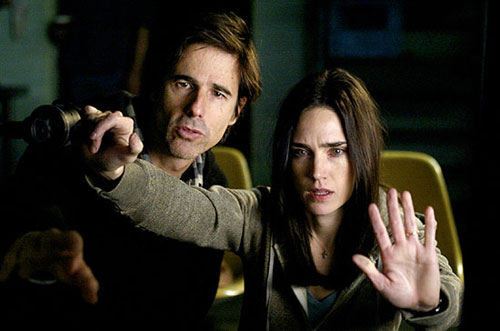
Q: Do you see this as a ghost story or a psychological horror film?
Yglesias: To me it’s a ghost story. I guess you could call it a psychological horror film, but to me it’s a classic ghost story. It has all of the elements, there’s a ghost with a tremendous psychological desire that unites in some way to the heroine’s needs. That, really, is what the film is about. To me a horror film is more explicitly terrifying in terms of gore or some demonic character. Whereas a ghost story is a person you can understand, whose needs you can understand, which means it has kind of obvious impact on the characters. To me it’s a classic ghost story more like The Others or Turn of the Screw or any of the classic ghost stories.
Q: Given the spate of Japanese horror films getting remade, how hard is it to be original? Audiences seem to anticipate the twists.
Yglesias: If you’re referring to The Ring, it’s the exact reverse of The Ring. So to me all the twists were inherent in the fact that you had already seen The Ring. In The Ring they think they’re in pursuit of a poor girl who has been abandoned and in fact it turns out she is a demon. In our story it seems that she’s a demon and it turns out that she’s a poor girl who has been abandoned. I saw that as – even built into Suzuki’s work – being the answer.
Originality is a funny thing. Very, very few things are truly original. It more has to do with recent memory. To me, The Ring is more a true horror film, in that you’re dealing with a demon, a force that is not a person. Whereas, even the original Dark Water, is really about a character, about a specific ghost.
Q: Did you go to the book at all?
Yglesias: Yeah. I was given the film and the book and also the screenplay. The screenplay was almost identical to the finished film, it may have been a late draft. I read the book a couple of times and it’s different in certain key respects, but not very different.
I saw the film, I read the book and I saw the film again and then I left them aside. The cultural changes from the Japanese characters to the New York characters created a lot of plot changes right away. In the Japanese original she does not go up – almost the whole ceiling is falling in on her – and she doesn’t go upstairs to find out what’s going on for almost a whole week. In New York you get leaked on for five minutes and somebody shows up at your door. I had to make plot changes based on that. Once I began to change even basic stuff like that I had to change the plot, because it no longer applied to New York characters.
Q: Why do you think we’re seeing so many Japanese remakes now?
Yglesias: I actually think it’s the case, as it always is with American studios, that they tend to overmake one kind of film at any given time. I think we’ve been overmaking big action tentpole films. The Japanese films are more like the movies Americans made in the 60s and 70s, smaller and scarier films. Hitchcock’s Psycho, Polanski’s films, so on. The Japanese were making movies like that and somebody decided that was really scary. When you see a movie and it works it’s easier to say, OK we can try this. Somebody said, We’ll try The Ring, it really worked commercially and now they’re doing the same old thing, which is making as many as they can.
But to me it’s less that we’re being influenced by Japan and more that our entire movie industry, internationally, is in a giant cycle of self reference. The Japanese are influenced by our earlier films and they make them and we remake them.
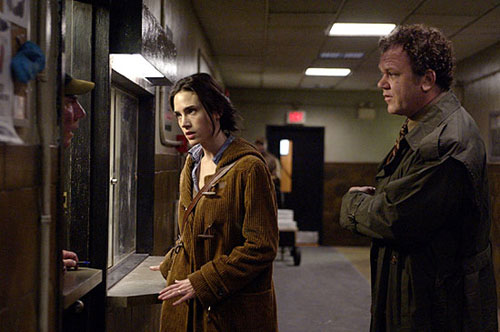
Q: From your unique position of adapting a Japanese film for Western audiences, do you think there are common things that scare people?
Yglesias: I think we all believe there is a very thin veneer of civilization and that if we acted on our pure emotions, if our ids were out of control, horror would result. I think that’s what’s really behind the Japanese film and this one, that the abandonment of the ghost and the need for a mother is so powerful that it’s truly unleashed if it’s not dealt with.
Another thing that’s in both the original and our film is a sense of urban isolation. Although I had to change a lot of things culturally in other respects, what I really retained from it was this sense of these characters all somehow being alone in a crowd. I think both Dark Waters, the original and ours, has this sense of horror, this sense that you’re in this place but you’re alone.
And then I think I discovered that plumbing is universally creepy.
Q: How happy are you with the finished film?
Yglesias: I’m really happy with the finished film.
Q: What works for you?
Yglesias: All the performances really work. Especially the two most demanding performances, Ariel’s and Jennifer’s. I don’t know if it’s clear to everybody how hard they are. They cover a really broad range of love and tenderness and comedy to real tragedy. And they never let me down. They carried that all the way through. Everybody else is great.
The look of the film is totally thrilling to me. The use of the city. As a New Yorker, when you write a script and set it at a very specific place you have no idea if it’s actually going to be shot there, so the fact that Walter fell in love with it and even made more of Roosevelt Island than I even had in the script since I couldn’t count on it being used, was really satisfying to me.
And then the specific sequences that I invented to be scary are as scary as I hoped. I’m totally happy with it.
Q: What are you working on next?
Yglesias: With my good friend Tom Schulman I wrote a script called Worst Case that was sold to Working Title. We’re just now looking for a director on it.
Q: What’s it about?
Yglesias: It’s a thriller. It’s about a guy who stumbles into a situation – a perfectly nice guy – who stumbles into a situation that’s terrifying. He’s been involved in an accident that leads to the death of the son of a Mafioso. Although he’s innocent –
Q: That really happened.
Yglesias: Yes, in 1981. We use that as a premise, but our story is different.
Q: Were you influenced by Hitchcock on this film?
Yglesias: I was, although I didn’t think of it when I was working on it. I grew up being scared by the Hitchcock movies and later the Polanski movies. So to me, suggestion is how those films always work, with a few exceptions. Anyway, I always find the fear of what might happen more terrifying than the reality of what does happen.
Q: I’m reminded of Repulsion.
Yglesias: Repulsion is a movie that I think this has a lot in common with, because there’s this long stretch in the middle of the film when she thinks she’s losing her mind. Also the wall coming to life. I certainly had that in my mind and I think Walter must have had it in his, since the way he uses the camera seems influenced by Repulsion.
It’s hard not to think of Polanski if you’re doing something really scary in an apartment.
Q: Can you explain for people who aren’t familiar with Roosevelt Island what that place is about?
Yglesias: It is a little hard to explain. Roosevelt Island is very close to Manhattan, it looks insanely close. It looks like you can swim across. It has one of the best views in the world of Manhattan. But it is strangely cut off, partly because you can’t get there easily by car from Manhattan. In the history of New York City, Roosevelt Island has always been a dumping ground. It was where they put typhoid victims, there were prisons there, there was a famous mental institution. It was never integrated into the City until the 1960s when they tried to by building these apartment complexes. And they’re still trying – they’re building luxury housing on one end of the island. In a lot of ways it makes sense that it would be a great place. But instead it’s always been a kind of weird way station for the refuse of the city.
When I was thinking of shooting a movie in the rain in New York, when you drive along the FDR drive and you look at Roosevelt Island in the rain, which I guess you can probably do today, it looks a little bit ghostly.
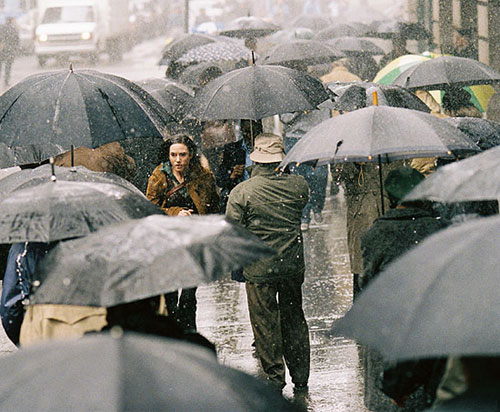
Q: Is it possible that this movie is too New York?
Yglesias: I have no idea. It’s possible. Since I’m a New Yorker, I wouldn’t know. There’s an awful lot about New York real estate. But I sort of assume from Seinfeld that New York is inherently interesting to people.
Q: Was there more about the background of the Jennifer Connelly character that you kept out of the script?
Yglesias: Everything we wanted you to know about the character we kept in. We wanted it to be a POV film like Repulsion, where you’re unsure whether what she’s telling you is the way the world is. So there’s that deliberate uncertainty about her husband’s behavior. We’re only hearing her side of it, we’re not sure – in fact, I think we told everybody that the reason he’s gone and had the affair is that she’s been neglecting him sexually since she had the child. It’s not a one sided problem.
We wanted you to be unsure at some point in the film as to what she’s telling you. There’s the scene where Tim Roth is telling her what the accusations against her are and we see her lie – the migraines don’t cause any disability – at that point we wanted you to wonder, is she crazy or is it something real?
Q: Back to the New York real estate – there were moments in this movie where I was thinking, this isn’t a horror film, this is a documentary about my experiences in New York apartment hunting.
Yglesias: Well, isn’t that a horror film?
Q: Very much! But as a lifetime resident of New York, are there elements of your experience that made it into the film in this regard?
Yglesias: Sure, just my whole youth trying to rent apartments. To me that’s the classic New York situation. Actually I can’t think of anything more terrifying than having to get a divorce with a kid and having to rent a place as quickly as possible. To me that’s real terror.
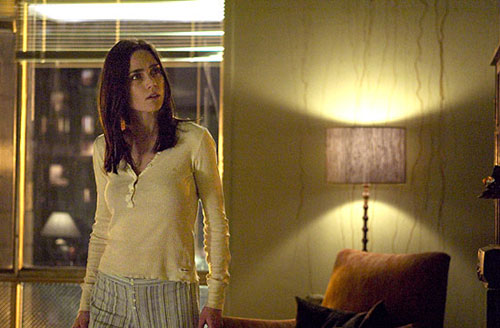
Q: How much of the film was shot in New York?
Yglesias: Everything that was essentially within the building with the exception of the apartment scenes themselves, and all the exteriors, were shot in New York. 3/5 were shot in New York, I think, and 2/5 were shot in Toronto. There’s a lot of intense interior stuff in the apartment itself that we did on soundstages.
Walter kept lengthening the shoot in New York as he wanted to use more and more of Roosevelt Island. But there’s nothing you see in the film, besides the interior of the apartment, that wasn’t in New York.
Q: Are you going to get hate mail from the Roosevelt Island Landlords Association?
Yglesias: I guess we should! To be fair to them it’s only that section of buildings. They did build luxury buildings that are, for all I know, spectacular.
Q: Walter can’t be here today, so I can’t ask him this question, but I know that his mother passed away when he was younger. Do you think that was something he thought about when making this film?
Yglesias: He talked to me about it quite a lot. I think that was why he was emotionally connected to the movie. Every director I’ve worked with there’s some direct psychological connection to the theme of the movie in their life. So when he told me about his mother it made sense to me that he wanted to do it. He talked about it a lot and it was sometimes tough for him to shoot certain sequences of the film as a result.
Q: Have you worked with Polanksi lately?
Yglesias: I worked with him quite a bit, six or seven months. Roman, of course, is in Paris and can’t come here – although I invited him to my older son’s bar mitzvah. He wrote a very funny note, “Wish I could be there with you guys but for some reason I can’t show up in New York.”
To be honest to you it wasn’t incredibly convenient to me to keep working with Roman, unless I wanted to get divorced, because I had to spend so much time in Paris. I had a great time working with him, he’s wonderful to make movies with.